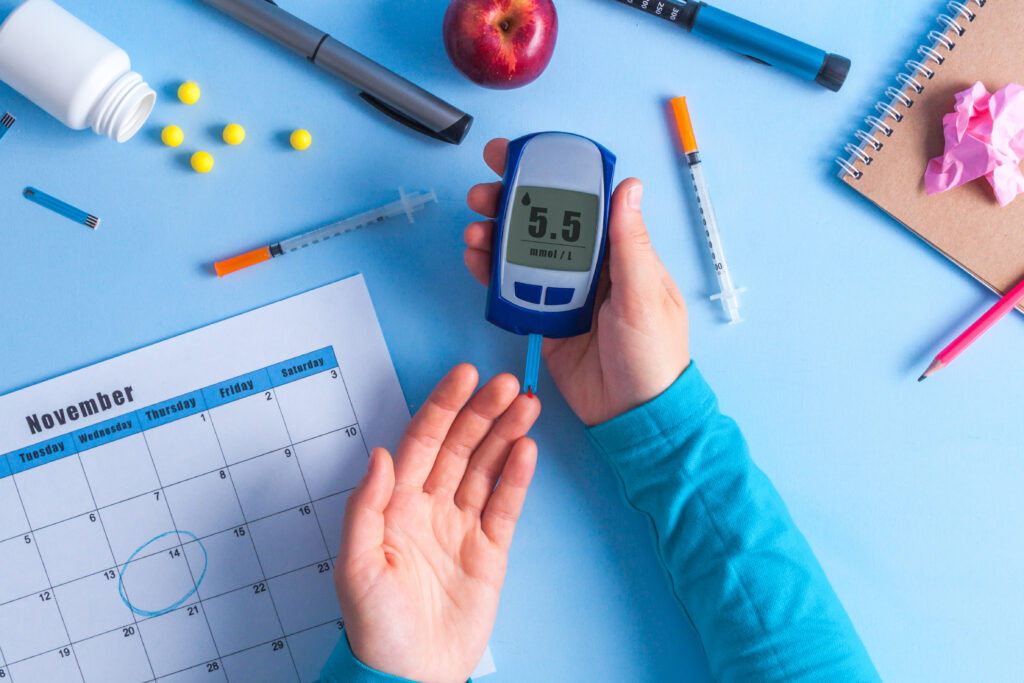Here is a little crash course on one of the most common health conditions in the United States: Diabetes. There are two main types of diabetes, type 1 and type 2, but the main idea is the same. Both types 1 and 2 are lifelong conditions due to the way that the body handles sugar in blood. To supply the body with energy, sugar from food has to enter the cells through a key called insulin. Without insulin, the blood sugar will be very high, which is a destructive state that damages blood vessels. When blood cannot be supplied properly to vital organs, such as the heart, eye, and kidney, it can lead to diseases all around the body. Therefore, it is important to manage diabetes with medications. Having a high blood sugar is not just about being “hyper” or getting a “sugar rush”. The effects of uncontrolled diabetes are not so sweet.
The main difference between type 1 and type 2 diabetes is the reason behind why sugar cannot be metabolized. A type of cells called beta cells in the pancreas produces insulin. In type 1 diabetes, the pancreas cannot produce any insulin because these beta cells are destroyed through an autoimmune response. As treatment, the patient has to get insulin. In type 2 diabetes, the cells either do not respond to insulin as well as it used to or the beta cells just do not make enough insulin. Depending on the patient, type 2 diabetics can be treated with non-insulin medications, insulin, or both.
25% of the health care costs in the United States is spent on diabetes and its complications. About 10% of Americans currently have diabetes, and 33% have prediabetes. Diabetes is not only a problem in the United States but also around the world. 422 million people have diabetes worldwide, with around 1.6 million deaths directly caused by diabetes each year. The scary part is that these numbers are only growing with time.
Diabetes cannot be cured, but it can be managed with medications. Therefore, diabetes medications will never go away. In fact, there is always room for growth in their research and development. Currently, there are 158 medications available for the treatment of diabetes. This wide variety is still not stopping pharmaceutical companies from investing their time and money into developing ‘better’ medications. Out of over 200 diabetes products currently in pipeline, three in particular shine bright like a sugar crystal.
1) Tirzepatide –by Eli Lilly (NYSE: LLY)
Tirzepatide is a combination of glucose-dependent insulinotropic polypeptide (GIP) and glucagon-like peptide 1 receptor agonist (GLP-1RA). These two hormones increase insulin secretion and inhibit glucagon secretion. This dual action works to lower blood sugar levels. Therefore, tirzepatide is a double threat that reduces A1c levels and leads to weight loss.
A1c levels refer to how much of the proteins in blood are coated with sugar. This gives an accurate measurement of how much sugar in blood there is, not just in the moment of time, but over the past three months. An A1c level greater than 6.5% is considered to be diabetes. On average, in three clinical trials, tirzepatide reduced A1c levels by 2.5% for those with A1c levels greater than 8% and reduced weight by 13.1%, which was 25 pounds. Tirzepatide’s outcomes are even better than those of its competitors currently on the market, including injectable semaglutide.
One of the best things about tirzepatide is that it can be administered once weekly, compared to insulin, which may have to be injected up to 4 times a day, with a minimum of twice a day. If approved, tirzepetide will be the first medication in the GLP-1/GIP combination class. Eli Lilly expects to apply for tirzepatide’s FDA approval sometime next year.
2) Teplizumab –by Provention Bio (NASDAQ: PRVB)
Teplizumab is a humanized anti-CD3 monoclonal antibody. Humanized monoclonal antibodies are made up of a human antibody with a little bit of mouse or rat antibody. Teplizumab inhibits CD3 (Cluster of Differentiation 3), which is protein complex that activates T cells and causes an immune response. This mechanism is perfect, because type 1 diabetes is an autoimmune disease caused by T cells destroying beta cells in the pancreas. Therefore, by inhibiting CD3, teplizumab reduces the destruction of beta cells, allowing them to produce insulin and control glucose levels. Having the slightest amount of rat antibodies in the human body may not sound the most appealing. But it is worth every drip because this drug has the power to slow down or prevent the onset of type 1 diabetes in those at high risk.
Teplizumab is the first drug proven to delay the diagnosis of type 1 diabetes by 2 years. In clinical trials, all participants were at high risk for developing type 1 diabetes. They had at least two autoantibodies specific to type 1 diabetes and also had unusual blood sugar levels. 72% of participants that did not receive any medications, known as the placebo group, developed type 1 diabetes in 24 months on average. On the other hand, only 43% of participants treated with teplizumab developed type 1 diabetes, which took them an average of 48 months. Patients who received treatment were able to get their blood sugar controlled and required less treatment with insulin. Therefore, teplizumab not only helped prevent and delay the onset of type 1 diabetes but also kept the condition under control. In addition, this study helped define what the criteria for a “high-risk population” is.
In another study, the median time until the diagnosis of diabetes was 27 months for the placebo group. On the brighter side, the median time for the teplizumab group was 60 months. These numbers prove that teplizumab not only reduces the chances of developing type 1 diabetes, but also delays its onset. Not only that, teplizumab led to improved rates of insulin production, whereas the placebo group experienced declined rates of insulin production due to disease progression. The side effects associated with teplizumab were short-term, including a rash and low white blood cell counts. However, these side effects were relatively manageable due to teplizumab being given as an intravenous (IV) infusion every day for 12 days. This 12-day course was given twice, six months apart.
On May 27, 2021, the FDA Advisory Committee reviewed the data behind teplizumab and held a vote on whether it should be used for delaying type 1 diabetes. The vote was closer than expected, which caused shares of Provention Bio to drop by 28.75% on May 28, 2021. Ten experts were in support for and seven experts were against teplizumab due to the lack of data and safety.
On July 2, 2021, the FDA will announce its final decision on whether it will approve teplizumab or not. Although it was a close vote, the FDA usually complies with final recommendations from the advisory committee.
3) Insulin Vaccine – by Diamyd Medical (DMYD-B)
Diamyd Medical is a Swedish pharmaceutical company that focuses on diabetes prevention. Diamyd has two medications currently in clinical development. One of these drugs is conveniently named Diamyd, which is now starting phase 3, and the other one, Remygen, is in phase I/II development. Although it is not publicly traded in the United States, this company is on the Stockholm Stock Exchange and Nasdaq First North Growth Market (DYMD-B).
Diamyd is an insulin vaccine with a unique mechanism of action. It contains GAD65 (glutamic acid decarboxylase-65), which is an enzyme that is targeted by the immune system in type 1 diabetes. After GAD65 triggers an immune response, these immune cells become active anti-inflammatory cells. They tell the immune system to stop attacking beta cells so that they can properly make insulin. Therefore, it could prevent or delay the onset of type 1 diabetes.
Diamyd Medical focuses on precision medicine by developing medications specific to the patient’s gene, specifically known as the HLA DR3-DQ2 haplotype. Over 90% of children with type 1 diabetes have either the DR3-DQ2 and/or DR4-DQ8 gene. Therefore, Diamyd is currently focusing on young patients that were diagnosed within the past six months. In clinical trials, participants were injected with this vaccine in their lymph nodes three or four times in 15 months, which led to increased insulin secretion.
Although this vaccine initially had disappointing results in 2011, Diamyd Medical did not give up. Due to more clarity on its specific target population with precision medicine, this vaccine could be the right medication for the right person at the right time.
Due to the nature of this disease, diabetes will simply not go away. The good news is that when it is managed well with medications, its complications will significantly decrease. Therefore, medications should be a significant part of every diabetic’s life. These three medications will not completely get rid of diabetes as a whole, but they provide a vision for hope in diabetics.








4 thoughts on “3 PROMISING DIABETES STOCKS”
Comments are closed.